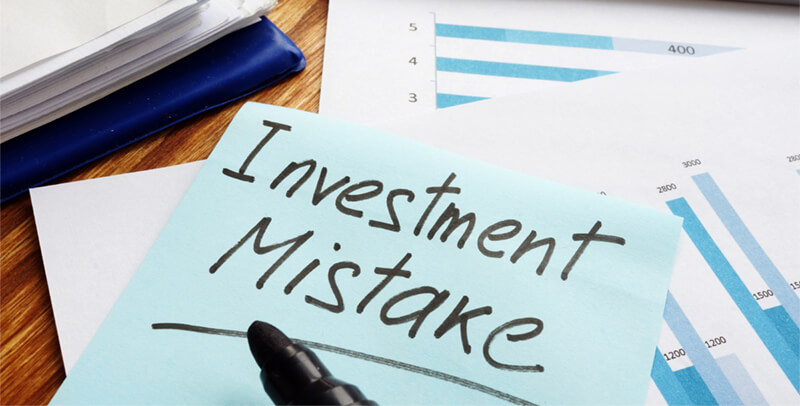6 MinsApril 29, 2022
We all work hard to earn a living. Thus, it is essential to carefully choose what we should do with our money. The rules for saving and investing may be different for each of us, based on our risk profile, age, income and other factors. However,
there are some common mistakes that we should all avoid for a healthier tomorrow. Let us see what those are:

Impulsive spending – Money is liberating and empowering. But when we are on a spending spree, our ability to save diminishes. It hinders us from fulfilling vital financial goals. Hence, don’t buy things just because
there is an offer; assess whether you need them.
Subscribe to the idea of delayed gratification, which means putting off purchases we do not need today for a future date. In other words, it means the ability to wait to get what we want. This allows us to save money for financial goals first
rather than spending it on unnecessary products or services.
Begin saving from the very first pay-cheque. If you are disciplined in handling money, every penny saved will be a penny earned.
As far as possible, keep your salary account and savings account separate. Open another Savings Bank Account to park
the money saved and earn interest on it. Alternately, one can also consider investing short term money in debt funds commensurate with individual investment horizons and risk profiles.
Choosing the cheapest option when shopping – In the bargain to consciously save money, opting for the cheapest options does not necessarily help you save more. A cheap product may not last long. Imagine you buy a cheap
microwave for around Rs 3,000, and in a short time, it begins to malfunction. In such a case, you may spend more money repairing it. This is not only an inconvenience but will also impact how much you effectively manage to save.
Don’t be penny wise and pound foolish. Choose good quality products that will last long. This way you can save money on maintenance in the long run.
Also, draw up a budget to find out how much you are spending and where. This will help curtail unnecessary expenses.
[Also Read: 5 Things You Need to Know About SIP Investments]
Reckless use of credit cards – Credit cards offer a host of benefits. But when you use them indiscriminately, you could end up with high and sometimes unwanted credit card debt.
Paying only part of the credit card dues is also not a good idea because the high interest rates add up to increase your debt burden. Therefore, use your credit cards wisely and keep track of your expenditure to save money.
Focusing only on saving and not investing – Some of you may be saving but not investing in productive avenues. This means your money may not earn enough returns to beat inflation, which will, in turn, reduce its purchasing
power. In other words, make your money work hard for you.
For goals such as buying a home or a car, your child’s higher education, a foreign holiday, your retirement, etc, it is necessary to plan and invest wisely.
Choose the investment avenue best-suited for you and earn efficient returns. Only then will you be able to make your money work for you, i.e. compound your wealth, counter inflation, and achieve
the envisioned financial goals. Some options to consider are bank Fixed Deposits, PPF Accounts,
equity, hybrid and debt mutual fund schemes, etc. Make regular investments from your Savings Account and automate them if possible. This will help maximise returns instead of keeping
excess funds in the savings account.
Not having an emergency fund – There may be unpleasant surprises in your lives. You don’t know what the future has in store. If you do not hold an adequate emergency fund (also known as a contingency fund or a
rainy-day fund) and you are faced with a sudden need for money, you would have no choice but to dip into your investments set aside for your financial goals.
Hence, hold at least 12 to 18 months of regular monthly expenses, including EMIs, as an emergency fund. This money could be parked in a separate Savings Account (other than the one linked to your investments) and/or term deposits. To meet your
contingency needs the money should be available easily and as and when you need it. Hence, choose avenues that offer secure returns.
In-adequate insurance cover – Today, ailments and medical conditions due to stress and lifestyle are very common. If you are hospitalised and don’t have a health insurance cover, it could wipe out a considerable
part of your savings, given the high healthcare costs. Hence, ensure you have an adequate health cover, taking into account your health, family’s medical history, and other factors.
Likewise, if you are the family’s breadwinner, ensure you have an optimal life insurance cover. Take into account your age, monthly income, expenses, liabilities, existing life insurance cover (if any), the amount needed to fulfil financial
goals, and inflation among other factors.
Educate yourself on money matters by reading financial blogs, journals, magazines, newspapers, etc. This will help you broaden your perspective and help you handle money better.
Disclaimer: This article is for information purpose only. The views expressed in this article are personal and do not necessarily constitute the views of Axis Bank Ltd. and its employees. Axis Bank Ltd. and/or the author shall not be responsible for any direct / indirect loss or liability incurred by the reader for taking any financial decisions based on the contents and information. Please consult your financial advisor before making any financial decision
Mutual Fund investments are subject to market risk, read all scheme related documents carefully. Axis Bank Ltd is acting as an AMFI registered MF Distributor (ARN code: ARN-0019). Purchase of Mutual Funds by Axis Bank’s customer is purely voluntary and not linked to availment of any other facility from the Bank. *T&C apply












